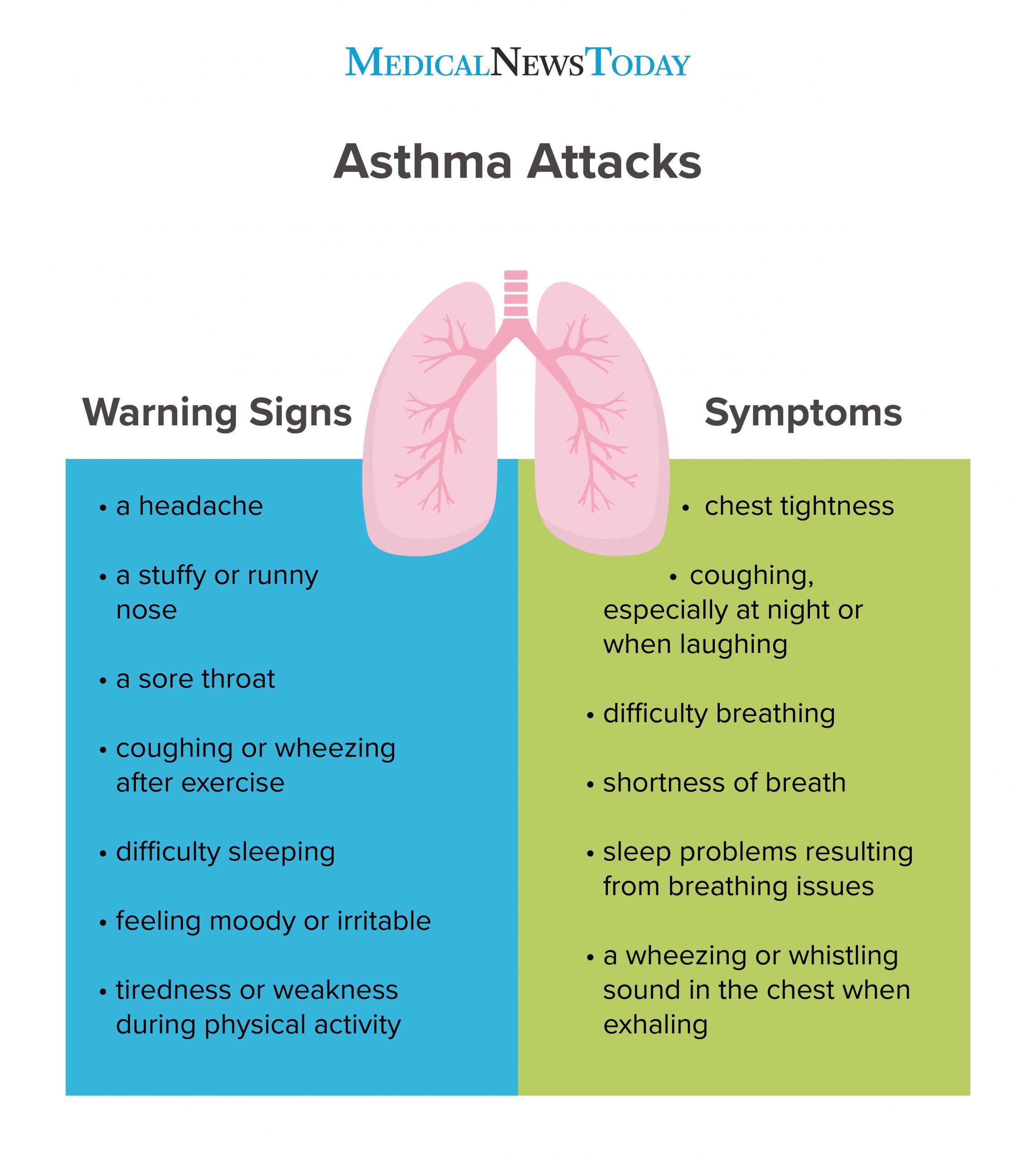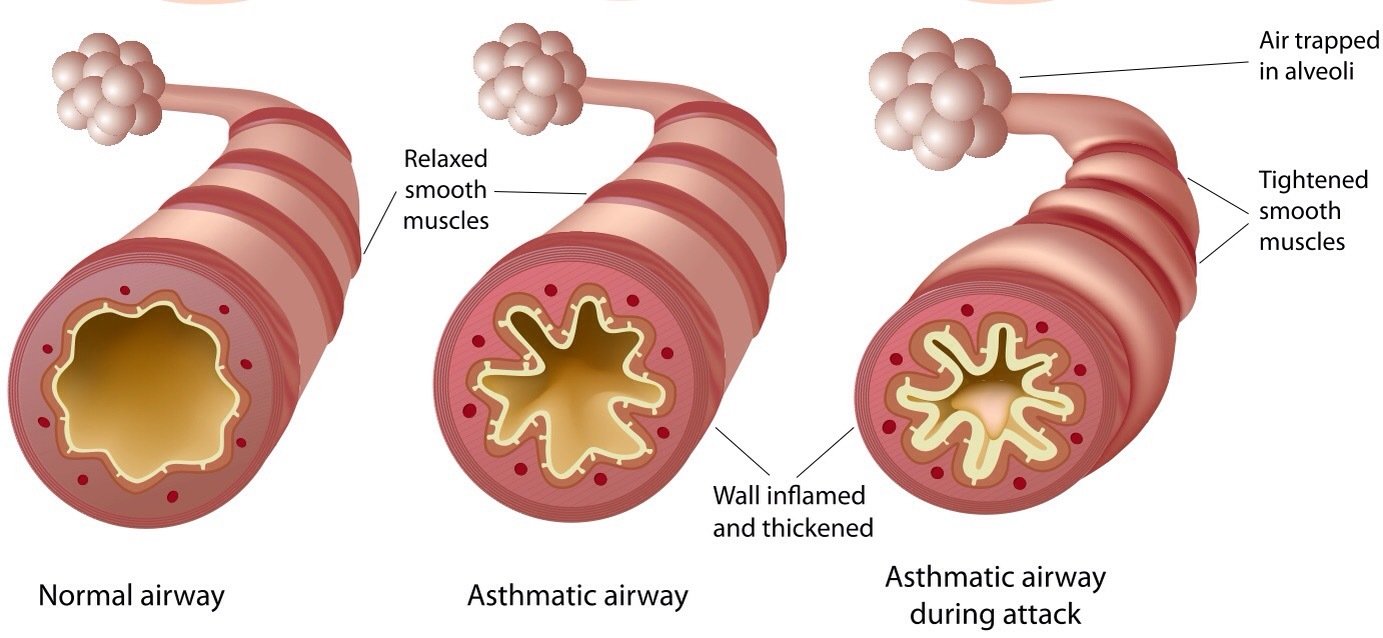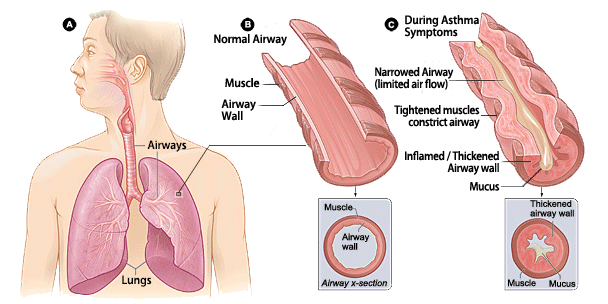What About Medicines For Blood Pressure
Beta-blockers, used to control blood pressure and heart disease, can make asthma worse. This group of drugs includes propranolol, atenolol and metoprolol. If you have started taking a beta-blocker and your asthma gets worse, tell your doctor.
ACE inhibitors are another type of medicine given to treat blood pressure, heart disease and, sometimes, diabetes. Drugs such as captopril, enalapril and lisinopril are included in this group. These medicines appear to be safe for people who have asthma. However, some people develop a cough when taking ACE inhibitors. If you start coughing while youre taking an ACE inhibitor, remember that the cough might not be caused by your asthma. If the cough is caused by the ACE inhibitor, it will usually go away a week or so after you stop taking the medicine. If you develop other problems that make your asthma worse, call your doctor to see if you should stop taking your ACE inhibitor.
Physical Exertion During Exercise Can Trigger Asthma Symptoms
Exercise can also trigger asthma symptoms due to the increased breathing rate that brings drier air into your lungs. This causes your airways to narrow making it harder to breathe leading to decreased endurance, coughing, wheezing, and other asthma symptoms.
This is called exercise-induced bronchoconstriction , or commonly exercise-induced asthma. According to the American College of Allergy, Asthma, and Immunology, 90% of people with asthma have EIB, but not everyone with EIB has asthma. Many professional athletes compete with EIB the goal of an asthma treatment plan is to let you enjoy your exercise and sports.
Can Asthma Be Prevented
Asthma cant be prevented entirely, but there are some practical ways to reduce the risk of an asthma attack and live well with asthma.
- Get vaccinated for influenza: flu and other respiratory viruses are common triggers for asthma.
- Manage any allergies: asthma and allergies are closely linked, so treating allergic rhinitis and avoiding or managing any allergy triggers will help with your asthma.
- Live smoke-free: quit smoking if you smoke, and avoid any second-hand smoke .
- Eat well: a balanced diet helps you to maintain a healthy weight. Being overweight or obese makes asthma harder to manage.
- Care for yourself: mental health and asthma are linked, so let a trusted friend or your doctor know if you have been feeling sad or anxious, or dont enjoy things as much as before.
- See your doctor regularly: asthma needs to be regularly assessed and managed, and your medication needs may change over time. Ensure your asthma action plan is up to date by checking in with your doctor regularly.
Also Check: Can You Join The Army If You Have Asthma
Treating And Managing Flare
Talk to your doctor about how to handle flare-ups, and let them know if they happen a lot. They may need to change your treatment plan.
Some flare-ups get better after you rest and take over-the-counter pain meds for a couple of days. Call your doctor if they last longer than that, or if your symptoms are intense.
Medication changes. You might need to adjust your medication temporarily, or add a new one. Medicines that can help with flares include nonsteroidal anti-inflammatory drugs , either prescription or over-the-counter. You may take them as a pill or put them on your skin. Acetaminophen helps some people. Your doctor may also inject steroids into your joints.
Rest. One of the best ways to deal with a flare is to take it easy. Take a sick day if you need to. Ask family members to help out with chores. But try not to stop moving completely. Do a few gentle stretches to keep yourself from getting stiff.
Hot and cold therapies. Moist heat around your joints boosts blood flow and relaxes muscles. A warm paraffin wax dip may make your hands or feet feel better. A special machine heats the wax, which is the same type used in candles.
If too much exercise causes flare-ups for you, use an ice pack right after your workout to ease pain. A cold compress may help at other times, too. Cold constricts your blood vessels, which decreases blood flow. That leads to less pain.
Limit the use of either of these methods to two to four times a day, for no more than 15 minutes at a time.
Tips To Reduce Exposure To Pollen

The season for pollen allergies can last for several months and occurs when plants are flowering. The timing of your own personal allergy season will depend upon which plants you are allergic to, and when they flower.
A direct way to manage pollen allergies is to reduce your exposure to pollens. Pollen counts are published in the media and can help you to plan to avoid exposure.
To reduce your exposure to pollen during peak times:
- Stay indoors in the morning, if possible grass pollens mainly circulate in the morning.
- Avoid mowing the grass, or wear a mask when you mow if someone else is doing the mowing, stay indoors while they do so.
- Keep windows closed in your home and car.
- Avoid picnics in parks or in the country during the pollen season.
- Wear sunglasses to protect your eyes.
- Plant a low-allergy garden around your home, especially near the windows of your home.
Read Also: Is Eczema A Disqualifier For The Military
Acute Exacerbation Of Asthma Risk Reduction
One of the most important steps that may be taken to reduce the risk of asthma exacerbations is to learn what triggers symptoms and avoid them. For example, if dry, cold air causes symptoms, it may be useful to cover your nose with a scarf in cold weather. Other strategies that can help to reduce the risk of acute asthma exacerbations include:
- Wash your hands frequently and avoid touching your face to prevent getting colds or other respiratory infections.
- Make sure you take each asthma medication as prescribed by your physician.
- Regularly monitor your lung function using a peak flow meter and record your results.
- Use your rescue inhalers as soon as you develop symptoms of an asthma attack.
- Identify whether your use of quick-relief inhalers has increased lately. This could mean that your doctor needs to modify your treatment or adjust your doses. Never modify your treatment or self-medicate without talking to your health care provider first.
- If a physical activity triggers an attack, stop immediately and use your rescue inhaler as prescribed.
- Dont stop taking your treatment or reduce your doses without discussing it with your doctor first, even if you feel that your symptoms are improving.
Does Asthma Ever Go Away
Yup! A lot of kids find their asthma goes away or becomes less serious as they get older. Some doctors think this happens because the airways grow wider as a kid grows up and gets bigger. With more room in the airways, the air has an easier time getting in and out.
Some people do have asthma as adults, but it doesn’t have to slow them down. Some top athletes manage their asthma while still competing at professional and Olympic levels.
Don’t Miss: Do Steroid Inhalers Cause Weight Gain
Look Beyond The Obvious
There are some well-known and obvious triggers you should avoid when you have asthma cold air, dust mites, pollen, tobacco smoke, mold, and pet dander among them. But what about your favorite candle, thunderstorms, , or even traffic? Several odd or unusual things can trigger an asthma attack. If you have asthma, its important to identify your own particular triggers so you can try to avoid or at least be better prepared for a potential attack.
How Asthma Is Treated
While there is no cure for asthma, there are a number of treatments that can help control the condition.
Treatment is based on two important goals, which are:
- relieving symptoms
- preventing future symptoms and attacks
For most people, this will involve the occasional or, more commonly, daily use of medications, usually taken using an inhaler. However, identifying and avoiding possible triggers is also important.
You should have a personal asthma action plan agreed with your doctor or nurse that includes information about the medicines you need to take, how to recognise when your symptoms are getting worse, and what steps to take when they do so.
These symptoms are often worse at night and early in the morning, particularly if the condition is not well controlled. They may also develop or become worse in response to a certain trigger, such as exercise or exposure to an allergen.
Read our page on the causes of asthma for more information about potential triggers.
Speak to your GP if you think you or your child may have asthma. You should also talk to your doctor or asthma nurse if you have been diagnosed with asthma and you are finding it difficult to control the symptoms.
Read Also: How To Calm Down Asthma Symptoms
About Chemical Irritants And Asthma
Chemical irritants are found in some products in your house and may trigger asthma. Your asthma or your childs asthma may be worse around products such as cleaners, paints, adhesives, pesticides, cosmetics or air fresheners. Chemical irritants are also present in schools and can be found in commonly used cleaning supplies and educational kits.
Chemical irritants may exacerbate asthma. At sufficient concentrations in the air, many products can trigger a reaction.
What Is An Asthma Action Plan
Your healthcare provider will work with you to develop an asthma action plan. This plan tells you how and when to use your medicines. It also tells you what to do if your asthma gets worse and when to seek emergency care. Understand the plan and ask your healthcare provider about anything you dont understand.
Dont Miss: Nebulizer Medications Side Effects
Recommended Reading: Does Asthma Shorten Life Expectancy
Asthma Triggers: Gain Control
This video features medical professionals, families and children living with asthma.
Americans spend up to 90 percent of their time indoors, and indoor allergens and irritants play a significant role in triggering asthma attacks. Triggers are things that can cause asthma symptoms, an episode or attack or make asthma worse. If you have asthma, you may react to just one trigger or you may find that several things act as triggers. Be sure to work with a doctor to identify triggers and develop a treatment plan that includes ways to reduce exposures to your asthma triggers.
On this page:
You Cant Maintain Your Normal Exercise Routine

You may notice that youre unable to keep up with any type of physical activity if your severe asthma symptoms are getting worse.
Talk to your doctor if you find yourself coughing or having to use your inhaler more often at the gym or during activities like jogging or playing sports. If your chest tightens more often during everyday physical activities like climbing the stairs or walking around the block, you may need to change your medications to get your symptoms under control.
Read Also: How Do You Feel After An Asthma Attack
Don’t Miss: Does Asthma Medication Cause Weight Gain
What Are The Symptoms Of An Asthma Flare
Common symptoms are coughing, shortness of breath , a feeling of tightness in the chest and wheezing. It’s important to watch yourself every day for symptoms of asthma. You may have only one or two of these symptoms.
Another clue that your asthma is flaring up is that you have to take extra doses of your quick-relief asthma medicine more than twice a week because of these symptoms.
What To Do When Having An Asthma Attack
If you have asthma, then its important that you know what to do and not do if you have an asthma attack.
Its hard to predict exactly when an asthma attack will occur, so its also important to discuss your condition with your family, friends and employer. Its essential that they all become better acquainted with what happens and how to react and help if you have an asthma attack.
Recommended Reading: Breathing Treatment Side Effects
Whats An Asthma Flare
Kids with asthma might have days with no breathing problems at all. Thats a relief for parents and for kids because it means that the asthma is under control.
But when asthma symptoms like wheezing, coughing, or shortness of breath become more severe, more frequent, or both, its known as an asthma flare-up .
If the flare-up is severe, a person might:
- struggle to breathe or have rapid breathing even when sitting still
- be unable to speak more than a few words at a time without pausing
- have retractions in the neck and chest
What Types Of Asthma Are There
Healthcare providers identify asthma as intermittent or persistent . Persistent asthma can be mild, moderate or severe. Healthcare providers base asthma severity on how often you have attacks. They also consider how well you can do things during an attack.
Asthma can be:
- Allergic: Some peoples can cause an asthma attack. Molds, pollens and other allergens can cause an attack.
- Non-allergic: Outside factors can cause asthma to flare up. Exercise, stress, illness and weather may cause a flare.
Also Check: How To Get Rid Of Asthma Without Inhaler
Common Allergy Triggers Of Asthma Symptoms
Allergy triggers that can lead to asthma symptoms include:
- animal dander especially from cats and dogs
- mould spores which can be worse at certain times of the year
- pollen from grass, weeds and trees and usually occurring seasonally
- workplace substances such as latex, wood dust or flour.
Food allergies do not usually cause asthma themselves, but people with food allergies can be more susceptible to symptoms of asthma. Also, sulphites in food and drink may cause asthma symptoms.
What Is Asthma And Who Does It Affect
Asthma is a condition that affects the smaller airways of the lungs. From time to time the airways narrow in people who have asthma. This causes the typical symptoms. The extent of the narrowing, and how long each episode lasts, can vary greatly.
Asthma can start at any age but it most commonly starts in childhood. At least 1 in 10 children and 1 in 20 adults have asthma. Asthma runs in some families but many people with asthma have no other family members affected.
Asthma
- 4min
Also Check: How To Get Rid Of Asthma Without Inhaler
Can I Prevent Asthma Flare
You have the power to prevent flare-ups, at least some of the time. Heres what you can do:
- Always have your inhaler with you.
- Stay away from triggers that you know may cause flare-ups. Try to avoid being around smokers â and dont smoke yourself.
- If you use a long-term control medicine, follow your doctors instructions for taking it every day. Dont skip it or take less because you feel OK.
- Work with your parents and doctor to follow your asthma action plan.
Food And Food Additives Trigger Asthma

Food allergies can cause mild to severe life-threatening reactions. They rarely cause asthma without other symptoms. If you have food allergies, asthma can be part of a severe, life-threatening reaction called anaphylaxis. The most common foods associated with allergic symptoms are:
- Eggs
- Salads
- Fresh fruits
Food preservatives can trigger isolated asthma, especially sulfite additives, like sodium bisulfite, potassium bisulfite, sodium metabisulfite, potassium metabisulfite, and sodium sulfite, which are commonly used in food processing or preparation.
Read Also: How To Control My Asthma
Side Effects Of Steroid Tablets
Oral steroids carry a risk if they are taken for more than three months or if they are taken frequently . Side effects can include:
- easy bruising
- muscle weakness
With the exception of increased appetite, which is very commonly experienced by people taking oral steroids, most of these unwanted effects are uncommon.
However, it is a good idea to keep an eye out for them regularly, especially side effects that are not immediately obvious, such as high blood pressure, thinning of the bones, diabetes and glaucoma.
You will need regular appointments to check for these.
Want to know more?
Tips To Reduce The Risk Of Exercise
Exercise is an important part of a healthy lifestyle and can help to control asthma symptoms. Many top athletes, including Olympic medallists, have asthma.
Tips to reduce the risk of asthma symptoms during exercise include:
- Manage and control your asthma with preventer medication so you are less likely to have symptoms.
- Always carrying your reliever medication with you.
- Warm up as usual before exercising your doctor may recommend taking reliever medication 15 minutes before exercising.
- Cool down after exercising asthma symptoms can appear up to 30 minutes after exercising.
- If symptoms appear, start asthma first aid and return to exercise only if you can breathe freely. If symptoms appear a second time, start asthma first aid and do not return to exercise. Visit your doctor for a review of your asthma symptoms.
Don’t Miss: What’s An Asthma Attack Feel Like
